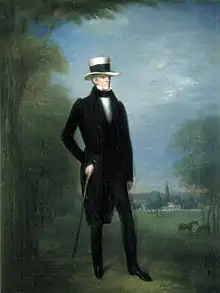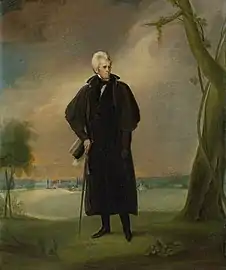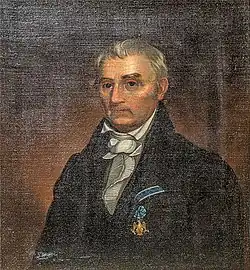Ralph Eleaser Whiteside Earl
Ralph Eleaser Whiteside Earl (born 1785–1788; died Nashville, Tennessee September 16, 1838), was an American painter known as the "court painter" to President Andrew Jackson.[1][2] He also painted the portrait of Rachel Jackson.
Biography
Earl was the son of portrait painter Ralph Earl and his second wife Ann Whiteside, and thus a member of the prominent Earle family. He was born c. 1785–1788, probably in New York City, and likely received his early training in portraiture from his father, whose naive style is reflected in the younger Earl's earliest works. He traveled to London in 1809, where he studied for a year with John Trumbull and was advised by Benjamin West to learn perspective, anatomy, and three-dimensional illusion. He remained in England until 1814, living with his maternal grandfather and uncle in Norwich and executing portrait commissions. He then traveled to Paris before returning to the United States in December 1815 to create grand-scale history paintings on the European model.[1]
As preparation for a planned project depicting the Battle of New Orleans, Earl met General Andrew Jackson and visited him at his Tennessee home, The Hermitage, in January 1817. Earl painted portraits of Jackson and his family and married Mrs. Jackson's niece Jane Caffery[3] on May 19, 1819. She died in childbirth in 1820, as did their son.[4][1][2]
After his wife's death, Earl became Jackson's close friend and lived with him at The Hermitage. When Jackson became President in 1829, Earl accompanied him to the White House, painting so many portraits of Jackson that he became known as the "Court Painter" and "the King's painter".[1][5] Earl returned to Tennessee with Jackson after his second term of office and died at The Hermitage on September 16, 1838.[1]
Works
_-_Ralph_Eleazer_Whiteside_Earl_-_overall.jpg.webp) Portrait of Mrs. Ebenezer Porter, c. 1804
Portrait of Mrs. Ebenezer Porter, c. 1804 Portrait of Rev. Ebenezer Porter
Portrait of Rev. Ebenezer Porter 1804 Ralph Eleaser Whiteside Earl family portrait illustrates Earl's early work's stiff postures and naive style.
1804 Ralph Eleaser Whiteside Earl family portrait illustrates Earl's early work's stiff postures and naive style. Gentleman portrait of Andrew Jackson, 1828–1833
Gentleman portrait of Andrew Jackson, 1828–1833 Andrew Jackson, 1830
Andrew Jackson, 1830 Portrait of Rachel Donelson Jackson (Mrs. Andrew Jackson) in Earl's mature style, c. 1830–1832
Portrait of Rachel Donelson Jackson (Mrs. Andrew Jackson) in Earl's mature style, c. 1830–1832 Portrait of President Andrew Jackson, c. 1830–1832
Portrait of President Andrew Jackson, c. 1830–1832 Portrait of Captain Willian Lytle, 1820s
Portrait of Captain Willian Lytle, 1820s
References
- Aronson, Julie (1992). "Ralph E. W. Earl". In Chotner, Deborah (ed.). American naive paintings. Washington Cambridge, England: National Gallery of Art Cambridge University Press. pp. 103–104. ISBN 0-521-44301-6.
- "Focus Works of Art: Andrew Jackson". North Carolina Museum of Art. Retrieved September 24, 2011.
- She was the daughter of Captain John Caffery and Mary Donelson (1751–1823), a sister of Mrs. Jackson
- "The First Tennessee Works of Fine Art by the Artist Who Was Close to Andrew Jackson Join the Colonial Williamsburg Collections". ArtfixDaily.
- Dorris, Mary C. (1915). Preservation of the Hermitage, 1889–1915. Smith & Lamar. pp. 193–197